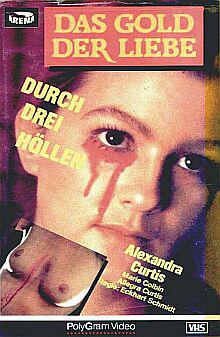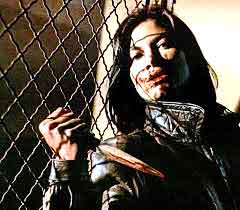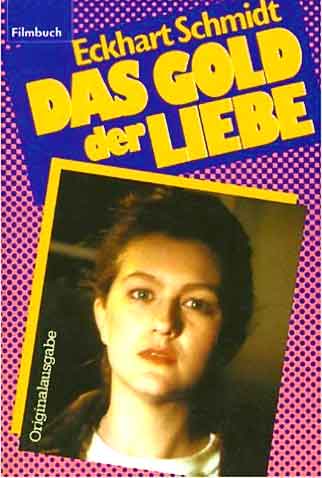 Germany’s Eckhart Schmidt’s little-seen follow-up to the fearsome DER FAN/TRANCE was this bizarre film, which offers a strikingly hallucinatory variant on many of that earlier film’s themes.
Germany’s Eckhart Schmidt’s little-seen follow-up to the fearsome DER FAN/TRANCE was this bizarre film, which offers a strikingly hallucinatory variant on many of that earlier film’s themes.
Schmidt views THE GOLD OF LOVE (DAS GOLD DER LIEBE; 1983) as the middle film of a trilogy that began with the abovementioned DER FAN in 1982 and concluded with 1985’s LOFT. THE GOLD OF LOVE was the most low budget of the three films, with a reported 10 day—or, more accurately, night—shoot whose off-screen antics apparently mirrored those of the sex, drugs and rock ‘n roll-fuelled phantasmagoria that ended up onscreen. It starred Alexandra Curtis, who’s best known as the daughter of Tony and sister of Jamie Lee.
The film’s obscurity is apparently due to unresolved music rights issues. To date THE GOLD OF LOVE’S sole appearance on home video was via a long out of print VHS release in its native Germany.
The teenaged Patricia is woken up one night by moonlight shining on her face. She finds herself drawn to the Metropol venue in Vienna, where a German punk band—the real-life punk outfit Deutsch-Amerikanische Freundschaft, or D.A.F.—is playing. Unfortunately she’s unable to get into the Metropol because she’s forgotten her wallet, causing her to cry tears of blood. She attempts to convince a mysterious brunette woman—identified in the credits as “Princess of the Night”—residing in a nearby apartment building to get her into the Metropol. In so doing Patricia witnesses the Princess of the Night dispassionately stab to death another woman. This makes Patricia a target for the Princess and the equally psychopathic gang of miscreants who accompany her.
Fleeing the gang, Patricia takes refuge in a nightclub stocked by all manner of strange individuals, including a couple brazenly having sex and motionless people who resemble mannequins (or is it the other way around?). Outside the club she catches sight of a luxury car driving by that emits a blinding white glow from inside, where reside the members of D.A.F.
Patricia enters a bar, but is immediately driven out by the sight of an overweight man putting a gun in his mouth. Upon entering another bar she meets a mysterious personage who identifies himself as Heller. It’s Heller who intervenes when the Queen of the Night enters the bar and attempts to stab Patricia. Shielding her with his body, Heller is stabbed but doesn’t die—and nor does he appear to experience any pain.

Patricia’s next stop is a hair salon, where she’s given a head massage by a woman who speaks of “the gold of love,” which apparently both she and Patricia are searching for. Following this Patricia enters yet another bar, where she’s threatened by a man with a gun but is helped by a kindly woman bartender. She also gets manhandled by an unseen creature and injected with heroin by the Princess of the Night. It’s in this altered state that Patricia once again sees the glowing car transporting D.A.F.’s members, who to her great shock turn out to be featureless skeletons.
From there Patricia’s “reality” dissolves entirely in favor of a fragmented succession of gory and disturbing visions that reveal the ugliness behind the façade presented by the music gods she so ardently worships.
This film recalls celebrated surreal-fests like Peter Del Monte’s INVITATION AU VOYAGE, Juraj Herz’s PASSAGE and Stanley Kubrick’s EYES WIDE SHUT. None of those films were entirely successful, of course, and neither is this one. As with TRANCE, THE GOLD OF LOVE contains a thoughtful and evocative framework topped off by gore that’s extreme even by traditional splatter movie standards. The mix doesn’t work nearly as well as it did in the previous film, coming off here as gratuitous and overwrought. The proceedings, after all, don’t pass muster as suspense or even straightforward splatter. As an atmospheric exercise in dreamlike apprehension, however, the film excels.
The filmmaking here is highly deliberate, utilizing long takes and repetition to impart a dreamy and somnambulant atmosphere. Schmidt’s wizardly visual sense is instrumental in this sense, imparting a nocturnal wonderland illuminated by ever-present neon (if nothing else, this film is very much a product of the eighties) and spotlights. Indeed, THE GOLD OF LOVE contains some of the most effective uses of spotlighting ever seen in a film; it’s just such a light that introduces the heroine at the beginning, and which toward the end provides us with a striking panorama of early morning Vienna.
Beyond that this film works simply as a clear-eyed depiction of the darker reaches of the punk music world. The symbolism–such as the depiction of the D.A.F. band members as featureless skeletons—tends toward the ham-fisted, but the eye-popping netherworld of drugs and depravity offered up by Schmidt more than makes up for the film’s shortcomings.
Of course, how you respond to the score by outfits like D.A.F., Stosstrupp and Wanderlust, which all-but overflows the soundtrack, is strictly a matter of taste—I’ll confess I found it a mite irritating!
Vital Statistics
THE GOLD OF LOVE (DAS GOLD DER LIEBE)
Starfilm
Director: Eckhart Schmidt
Producer: Martin Moszkowicz
Screenplay: Eckhart Schmidt
Cinematography: Bernd Heinl Bvk
Editing: Patricia Rommel
Cast: Alexandra Curtis, Allegra Curtis, Marie Colbin, Andre Heller, Regina van Tom, Herman Strobl, Andrea Wurstbauer, Margit Ovietz, Udo Broksch, Ossi Boz, Evi Meisel, Doris Bock, Jakob Mundy

